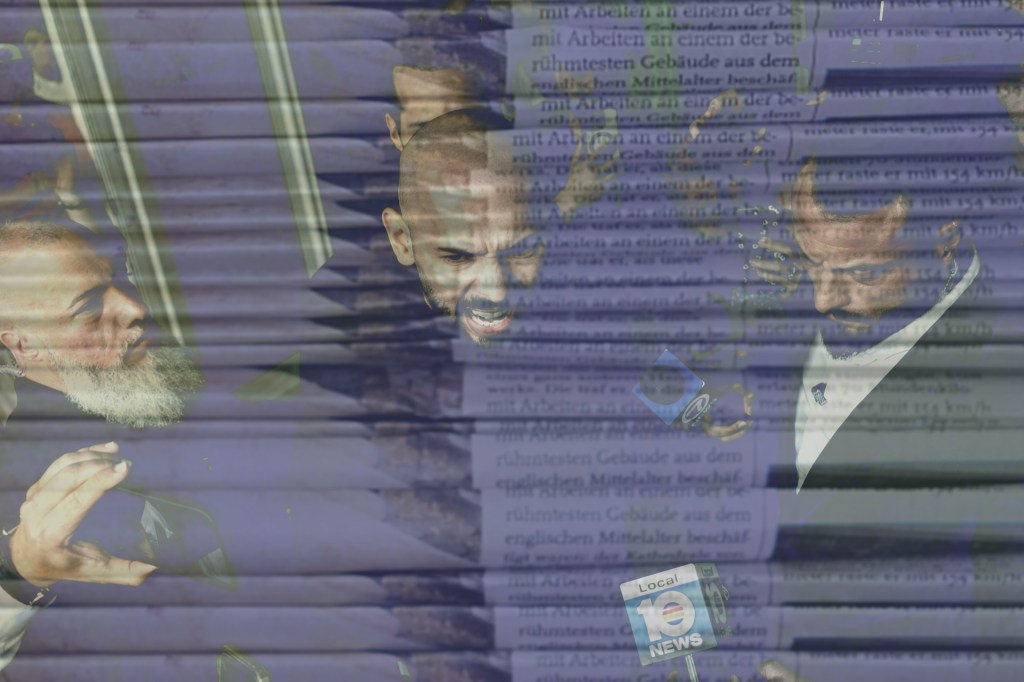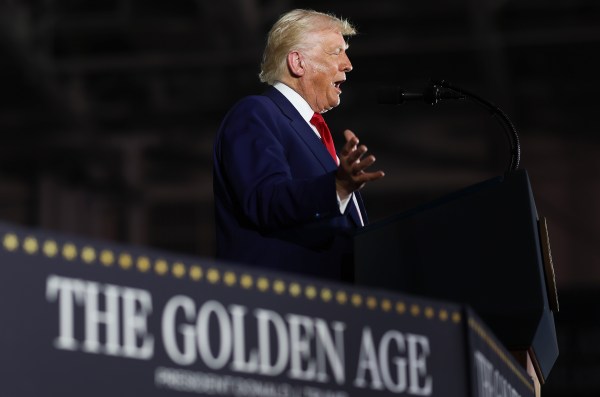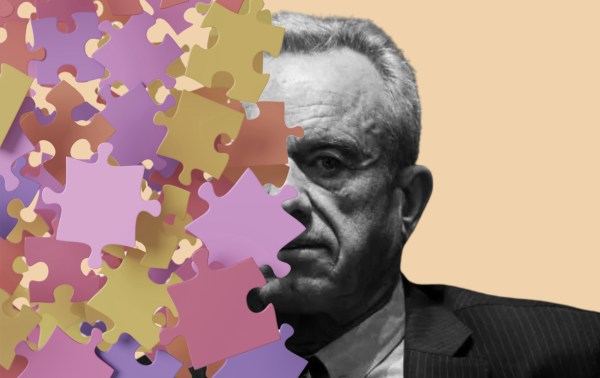You’d be forgiven for believing that the most influential figure in the lives of impressionable young boys today is a cigar-smoking former boxer named Andrew Tate, who is covered incessantly as the premier instructor in the dark arts of toxic masculinity, the Voldemort of the manosphere.
You see it in the headlines: “Barking at women, blocking doors: Teachers reveal Andrew Tate’s chilling influence on boys”; “Tate-pilled boys are a problem for schools”; “The Andrew Tate problem”; “Southport attack parents share Andrew Tate ‘radicalisation’ fears.” And you see it in the media at large: Educators are outing students for running informal Tate fan clubs, parents are vigilantly checking little Timmy’s internet history, and politicians are inviting Netflix showrunners to their office to speak about our dysfunctional young boys in search of Tate inoculations.
Tate is certainly a grotesque figure. He’s an alleged sex trafficker and peddler of Stone Age views about women. Yet, the media meltdown over Tate’s supposed hypnotism of young boys is misplaced. For all the recent controversy about Tate, there’s some evidence that fewer men genuinely respect him than media reports would have you think.
In early April, a Discord server called Men’s Human Rights ran a poll for its members to gauge support for Tate. Perhaps surprisingly, nearly half of the 75 respondents said he was a “scumbag harming boys,” an additional 12 percent said they “lean negative” on him and 14 percent called him “evil,” citing sex trafficking charges brought against him. Just 6 per cent said they viewed Tate as “really helpful” or “lean positive.” The vast majority had seen just a few clips of Tate’s, and just 3 percent said they watched several hours of his content.
But while these admittedly informal numbers—and some more formal numbers—point to lukewarm support for Tate, Denis Sharov, a university student in the United Kingdom who is a member of the server, noted that Tate’s support would likely be even lower if not for media bias against masculinity. “Andrew Tate would not be nearly as appealing or prevalent as he is if mainstream media treated boys [better],” Sharov said. “Both Tate and the whole incel hysteria in general could be easily solved if men get more sympathy and fair coverage from the media and stop demonizing masculinity.”
Indeed, the hysteria over Tate is emblematic of the mainstream media’s broader treatment of men and masculinity, which tends to fixate on fringe fears rather than robust conversation. This is a disservice given the massive changes reshaping manhood in the last two generations. Heartland jobs in iron mills and manufacturing have evaporated. Blue-collar incomes have stagnated. Men fill our jails and live on our streets. They end their lives at four times the rate as women and die years earlier.
There are so many desperately important stories to be told, but across the Anglosphere, the public conversation about gender politics remains mired in the trenches of our culture wars—pushing men deeper online in search of alternative media. Like most moral panics, it’s left us with a bewildering cocktail of cause and effect; a bitter aftertaste with few answers.
Justin MacPherson grew up on a farm in the Canadian province of Prince Edward Island alongside red sand beaches and lighthouses. The fog rolls in quickly here, and driving over the only bridge connecting the island with the mainland can feel like flying through the clouds.
“It was quintessentially the stereotypical potato farm. I was probably one of the last generations to be picked out of school in the spring or the fall to either help with harvesting or planning or clearing the fields of stones,” he said. “A very stereotypical masculine upbringing by a dad from the ’80s.”
MacPherson says he was a “terrible student” throughout high school. “I couldn’t figure out why I couldn’t sit still and listen and be attentive and catch all the information. I knew that I wasn’t unintelligent,” he said. Throughout those early years, he was drilled that to succeed, you need a degree “or you’re gonna be useless to everybody.” He eschewed a degree, spent two decades in the Canadian military—“crawled my way up” the special forces ladder—and proved that narrative wrong.
After retiring from the military, he worked in construction. He gained a new appreciation for the disproportionately male workforce that risks life and limb to build the creature comforts of our modern world.
“I see how difficult it is, even the amount of hardships that I’ve endured in the military, it’s comparable in the sense that every single day you are outside. No matter what the weather is. Every single day, you’re enduring the heat of the sun in the middle of the summer or the freezing cold winter. These guys are on top of these skyscrapers, and these guys are just eating the wind, eating the cold,” he said, speaking about the building up of Ottawa.
“The quote-unquote hyper-masculine traits are what’s keeping them up there: that sense of pride, the sense of camaraderie, and working with other men and trying not to show weakness even though it’s negative 20 degrees,” he added.
But MacPherson’s defense of masculinity is rarely heard in media today—and indeed, masculinity is much more often a punching bag, with “men” a favored target of headlines across the English-speaking world. “Why I hate men,” proclaims the Guardian. “Is toxic masculinity driving climate change?” asks Reuters. “There’s nothing more frightening in America today than an angry White man,” says CNN. “Why can’t we hate men?” contemplates the Washington Post.
Masculinity is also a major target of certain professional groups. “More than forty years of research,” the American Psychological Association pronounced in 2019, shows “that traditional masculinity is psychologically harmful and that socializing boys to suppress their emotions causes damage that echoes both inwardly and outwardly.” Researchers even developed a scale to measure problematic men who subscribe to traditional masculine ideology (TMI), which supposedly reflects “white, Western, heterosexual” values like “achievement, emotional control, antifemininity, and homophobia.”
Part of the problem seems to be that gender issues are third rails in the culture war. “I’ve been saying for over a decade—almost two decades—that men’s issues are not properly treated in society,” McGill University psychiatry professor Rob Whitley said. “What I don’t really like is it’s been used as a bit of a culture war issue when it actually benefits the whole of society.”
Whitley has written extensively about the distressingly high male suicide rate and gender bias among health providers to bring greater understanding to the conversation of men’s mental health. Still, he’d been warned repeatedly by colleagues to avoid the topic altogether.
“‘It’s so good that you do it,’” Whitley recalled one colleague saying. “‘But I would never do it because I’m afraid it will rile up the wrong people and then the higher-ups will think thank you’re a misogynist or some reprobate who wants to go back to the stone age.’”
Who exactly is commenting on masculinity today?
One such author is the feminist writer Caitlin Moran. “Modern masculinity is broken. She knows how to fix it,” a glamorous New York Times Magazine profile of her proclaims. In the profile, Moran makes the obligatory reference to Tate before explaining how the failure of men to mentor the coming generation of boys has left her in a position to fill in the gap.
“All the women that I know on similar platforms,” Moran says, “we’re out there mentoring young girls and signing petitions and looking after the younglings. The men of my generation with the same platforms have not done that. They are not having a conversation about young men. So given that none of them have written a book that addresses this, muggins here is going to do it.”
Moran isn’t alone. Susan Faludi, Barbara Ehrenreich, Camille Paglia, Jill Filipovic, Niobe Way, Ruth Whippman, Christina Hoff Sommers, Kay Hymowitz, Hanna Rosin, Norah Vincent, Thomas Page McBee and Christine Emba are all writers with recent commentaries, negative and more measured, on masculinity. And all of them—save for Paglia and McBee, who identify as transgender—are women.
So, where are the men?
Some male commentators proudly score on their own nets. “Men are hopeless, but don’t worry,” Michael Tomasky wrote in The New Republic last November. “Women will save America. As usual.” The following month, Bernd Reiter argued in Salon: “Aggrieved white men are a threat to democracy—history tells us we can’t ignore them.”
Warren Farrell might be one of the voices we’d expect to hear. He went to grad school in New York City during the Summer of Love and got swept up in the cresting tide of second-wave feminism, rubbing shoulders with Gloria Steinem. However, his commitment to the cause waned when he began to feel his fellow activists abandoning the promise of gender egalitarianism that first inspired him, in favor of solely advocating for girls and women. For example, Farrell butted heads with feminist friends over their opposition to reforming family courts to help both parents, particularly fathers, preserve access to their children following divorce.
“As long as I was writing from a feminist perspective, The New York Times published everything I wrote,” he wrote in a 2019 essay. “Once I began questioning the feminist perspective, The New York Times published nothing I wrote for a quarter century.” Farrell became one of the earliest and most prominent American voices speaking about the importance of fatherhood, gender bias within the family court system, and the emotional straitjacket of old school masculinity.
Jordan Peterson, perhaps the most influential public thinker for boys and men in the last two decades, has also been locked out. To date, he has apparently not authored anything in elite outlets. The coverage of him, however, has been rough: the Times dubbed him the “Custodian of the Patriarchy” and The New Yorker claimed he was an inheritor of “the professional pickup artists who proliferated in the aughts” with a slight twist.
Farrell and Peterson have effectively been barred from expressing themselves in mainstream media. They are not allowed to take up pens in their own defense; to share countervailing views about men and masculinity without the filter of a reporter’s lens or a reviewer’s critique.
The same goes for Mike Rowe, the TV host who came to prominence on shows like Dirty Jobs and Somebody’s Gotta Do It. Although he’s spoken passionately about the importance of blue-collar work and men dropping out of the workforce, you’ll mostly find his views aired by places like Fox News—which, at least implicitly, ties men’s problems even tighter to the political right. And that seems like a solvable problem for a mainstream media that is highly concerned about gender polarization.
The lack of constructive voices about men’s issues in the mainstream media has pulled at least some young men away from that media—and toward alternative sources. David Foerster Jr. was raised in a liberal household in Maryland rooted in the belief “there are no gender roles and anybody can do anything.” But when his wife confided she was more interested in being a mother and a homemaker, he began to rethink his politics. He became interested in evolutionary psychology, sex differences between men and women, and began listening to podcasters like Chris Williamson, who hosts conversations often geared toward younger guys and men.
The 32-year-old’s political shift from Bernie Bro to a more conservative mindset opened his eyes to the mostly negative coverage of men in the mainstream media. “I tend to steer away from mainstream news,” he said, acknowledging he’s pulled to “more alternative media.”
“They perceive it (masculinity) as a threat and they try to squash it and get the worst representation possible of the manosphere or red pill environments,” he said. “So, what would I get there except: boys bad, girls awesome?”
Andrew, an American college student in Missouri and self-declared “left-wing male advocate,” feels the same about the general messaging of elite media. He admitted to rarely reading mainstream news “because it is often biased against males. … It often blames men as a whole for their own problems without making good suggestions.” He also felt “it belittles the problems men experience or it puts it through a ‘feminist’ lens that only values the well-being of males as it relates to females.”
Writer and social scientist Richard Reeves represents the rare male voice that has established a small foothold in mainstream media. Reeves, whose 2022 book Of Boys and Men was widely covered and well-regarded, succeeded likely because he speaks and writes in the cadence of data-driven policy recommendations. He sticks to generally uncontroversial points most Americans approve of: encouraging men to enter HEAL fields (health care, education, administration, literacy) and advocating for equal paid parental leave.
Reeves, founder of the American Institute for Boys and Men, believes the disconnect between guys and mainstream media stems from a matter of substance and style. “I think it is fair to say that mainstream media has not engaged with a lot of the issues many men, especially young men, are interested in,” he said.
He recalled his efforts during the pandemic to pitch a story to an American newspaper about COVID-19’s disproportionate felling of men compared to women, but the reporter passed. “Men’s health doesn’t get any readers,” the journalist confided. Reeves disagreed and pointed to men’s interest in fitness, nutrition, and well-being as prime examples.
Coding those topics, and others like education and dating, as female-oriented, Reeves feels, is drawing men away from mainstream outlets. “On a lot of podcasts, you’re talking about—alternative media—those are central concerns quite often; they’re just more directly addressing the issues and questions that men are currently interested in and asking.” Podcasts, and their longform, unstructured nature, he believes, also appeals to guys more.
“It turns out that actually guys really like sitting around shooting the shit,” he joked, referencing the comedian Theo Von’s podcast conversation with then-vice presidential candidate J.D. Vance.
Reeves believes that journalists are warming up to the idea of compassionate and robust reporting about boys and men, but still sees “a danger, particularly within, I guess, the liberal media, mainstream media, that the permission space to write about men is in that more kind of negative way,” he said.
“ I think that writing about men as the problem has quite a bit of space in these kinds of outlets, but talking about men having problems is something of a narrative violation,” he added. “It pushes up against the edges of what’s more acceptable in those spaces.”
Part of the problem, Reeves believes, is that men are not attuned to thinking about gender. Women, by contrast, who historically organized and struggled for equal rights, are more likely to engage and weigh in on such topics.
“ Women are more, historically, much more interested in issues around gender, because gender has generally been seen through the prism of women and girls, for obvious and good reasons,” he explained. “What that means is journalists and writers who have a track record of thinking about gender are overwhelmingly women who might now be turning their attention to men, and that’s not necessarily a bad thing.”
He’s been heartened by recent developments: Melinda French Gates recently appointed Reeves to oversee a $20 million fund to help initiatives aimed at boys and men.
Mark Brooks, a policy adviser with the All-Party Parliamentary Group on Men’s and Boy’s Issues in the U.K., is also seeing minds slowly changing in this space. Awareness about the male loneliness epidemic, for example, is growing—but there are still institutional holdouts.
“What’s lagged behind has been what I would call establishment and political support,” he said, speaking about governments across the United Kingdom. “[Government has] been really lagging behind in producing policies and actions to actually support men and boys in their community.”
Brooks spoke highly about Reeves’ approach in this space and characterized it as: “We can think two thoughts at once.” More specifically: “We need to challenge that (mainstream) narrative about all women have problems, all men are problems. We need to challenge it from the media perspective, a political perspective, a policy perspective.”
Denigrating masculinity is so routine that we have become desensitized to it. A recent article in New York Magazine, “Masculinity will not save men,” encapsulates why men like MacPherson, Foerster Jr., and Sharov have withdrawn from the mainstream marketplace of ideas and are looking elsewhere. It ritualistically references Tate six times and warns that Republicans are nefariously appealing to masculine desires for hierarchy, freedom and heroism.
“The crisis is real, to an extent,” journalist Sarah Jones writes of the struggles of boys and men, before quickly backpedalling to ensure our sympathy doesn’t overshadow her real concern. “Men are in trouble, and that means everyone else is in trouble too. The return of Trump and the growth of misogyny are real political problems for women, for the economy, and for democracy itself.”
“The goal isn’t to help men, but to minimize damage to women,” Foerster Jr. said when I asked him what he thought about Jones’ story. “Throughout the entire piece about men, she can’t even list a single thing that men are good at which society requires.”
For all the changes men have undergone over two generations, there should be a flourishing conversation about how to help them navigate those changes. Unfortunately, mainstream narratives remain simplistic and stereotyped. Piece after piece about a toxic “manosphere” seem like they might tell us more about the fears of elite America rather than the actual state of men on the ground. It’s time to drop some of the Tate chatter, and begin earnestly addressing the issues of your Average Joe.
A good place to start would be to broaden the public square of debate to include more men—figures such as Peterson, Farrell and Rowe—on their own terms. Speaking to men and boys compassionately—and regarding them as equally deserving of representation in the public square—would also likely bring them off TikTok and Reddit and into mainstream discourse, creating a space for them to engage and feel heard.
From my reporting, it seems that boys and men are hungry to grapple with the changing frontiers of masculinity. Opening up the public commons to earnest and fair conversations about manhood will bring guys out of the shadows, away from the likes of extremist voices like Tate, and into a compassionate mainstream—a mainstream where the problems facing men today could actually start to be fixed.
“The key is that whilst we need to keep talking and researching, we need to start doing,” Brooks said. “That is the final piece of the jigsaw that is now urgent.”









Please note that we at The Dispatch hold ourselves, our work, and our commenters to a higher standard than other places on the internet. We welcome comments that foster genuine debate or discussion—including comments critical of us or our work—but responses that include ad hominem attacks on fellow Dispatch members or are intended to stoke fear and anger may be moderated.
With your membership, you only have the ability to comment on The Morning Dispatch articles. Consider upgrading to join the conversation everywhere.